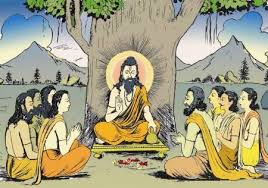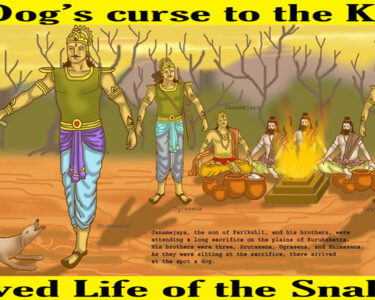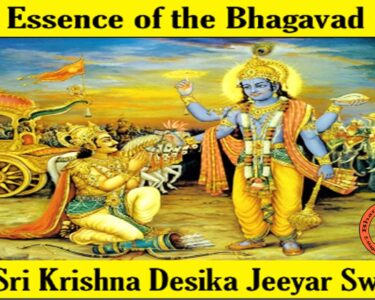“(Rishi) Shaunaka said, ‘For what reason did that tiger among kings, Raja Janamejaya, determine to take the lives of the snakes by means of Sarpa Satra? O Soota, tell us in full the true story. Tell us also why Aastika, that best of Dwijas (Dwija means twice-born, while the first birth is natural, the second birth happens upon the realisation of the Supreme Soul), that foremost of Rishis, rescued the snakes from the blazing fire. Whose son was that monarch (Janamejaya) who conducted the Sarpa Satra? Also, whose son was that best of Dwijas (Aastika)?’
SRIMAD MAHABHARATA – AADI PARVA – AASTIKA (UPA) PARVA – PART 13 – JARATKAARU AND YAAYAAVARAAS
“Soota said, ‘O best of speakers (Rishi Shaunaka), this story of Aastika is long. I will duly narrate it in full, O listen!’
“Shaunaka said, ‘I am desirous of hearing at length the charming story of that Rishi, that famous Brahmana named Aastika.’
“Soota said, ‘This history (first) recited by Krishna-Dwaipaayana (popularly known as Veda Vyaasa), is called a Puraana by the Brahmanas. It was formerly narrated by my wise father, Lomaharshana, the disciple of Vyaasa, before the dwellers of the Naimisha forest (Naimishaaranya in Sanskrit) at their request. I was present at the recital, and, O Shaunaka, since you ask me, I shall narrate the history of Aastika exactly as I heard it. O listen, as I recite in full that sin-destroying story.
“The father of Aastika was powerful like Prajaapati. He was a Brahmachaari, always engaged in strict devotions. He ate very less, was a Maharishi, and had his desire under complete control. He was known by the name of Jaratkaaru. That foremost one among the Yaayaavaraas, one who knows and follows Dharma and of rigid vows (Vrata in Sanskrit), highly blessed and provided with great Tapas power, once undertook a journey over the world.
“He visited various places, bathed in various sacred waters, and rested where night overtook him. Provided with great energy, he practised Dharmic austerities, hard to be practised by men of uncontrolled souls (Atma in Sanskrit). The Rishi lived upon air only, and renounced sleep for ever. Thus, going about like a blazing fire, one day he happened to see his ancestors, hanging heads down in a great hole, their feet pointing upwards. On seeing them, Jaratkaaru addressed them, saying:
‘Who are you thus hanging heads down in this hole by a rope of veerana fibres that is again secretly eaten into on all sides by a rat (Mooshaka in Sanskrit) living here?’
“The ancestors (of Jaratkaaru) said, ‘We are Rishis of rigid vows (Vrata in Sanskrit) called Yaayaavaraas. We are sinking low into the earth for want of offspring. We have a son named Jaratkaaru. Misery to us! That wretch has entered upon a life of Tapas only! The fool does not think of raising offspring by marriage! It is for that reason, viz., the fear of extinction of our kula, that we are suspended in this hole. We proceed like unfortunates that have none (to help us), even though we have one! O excellent one, who are you that thus sorrowly enquire as a friend on our account? We desire to learn, O Brahmana, who you are that stand by us, and why, O best of men, you sorrow for us that are so unfortunate.’
“Jaratkaaru said, ‘You are my Pitara and Pitaamahaas. I am that Jaratkaaru! O, tell me, how I may serve you.’
“The ancestors then answered, ‘O child, try your best to father a child to extend our kula. O excellent one, you will then have done a meritorious work for both yourself and us. Not by the fruits of Dharma, not by Tapas well stored up, one acquires the merit which one does by becoming a father. Therefore, O child (Jaratkaaru), by our command, set your heart upon marriage and offspring. This is our highest good.’
“Jaratkaaru replied, ‘I shall not marry for my sake, nor shall I earn wealth for enjoyment, but I shall do so for your welfare only. According to this understanding, I shall, agreeably to the Shaastric orders, take a wife for attaining the end. I shall not act otherwise. If a lady may have the same name as mine, whose friends would, besides, willingly give her to me as a kanya dhaan, I shall wed her duly. But who will give his daughter to a poor man like me for wife. I shall, however, accept any daughter given to me as alms (Bhiksha in Sanskrit). I shall endeavour, O ancestors, thus to wed a girl! Having given my word, I will not act otherwise. Upon her I will raise offspring for your rescue, so that, O fathers, you may attain to eternal regions (of bliss) and may rejoice as you like.’”



